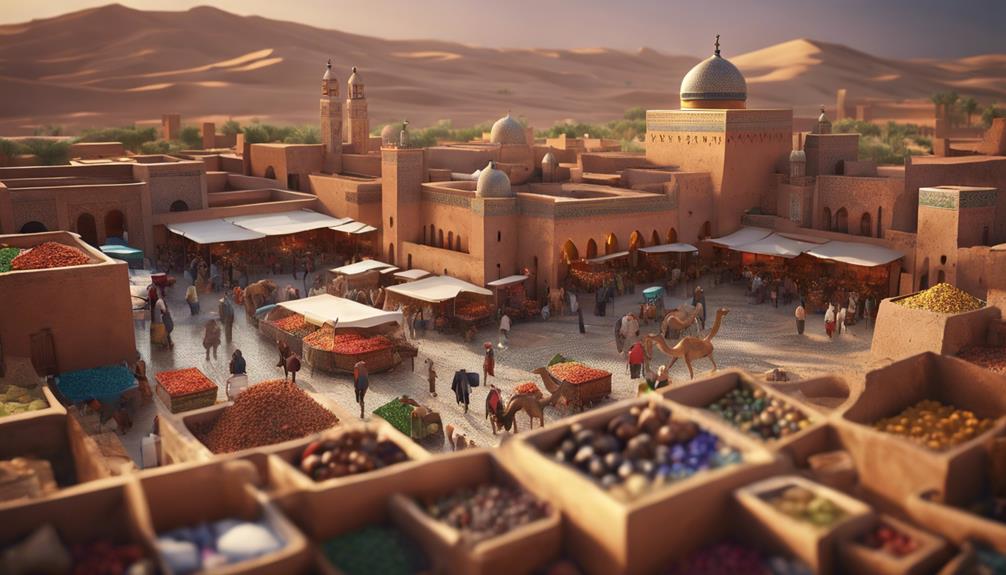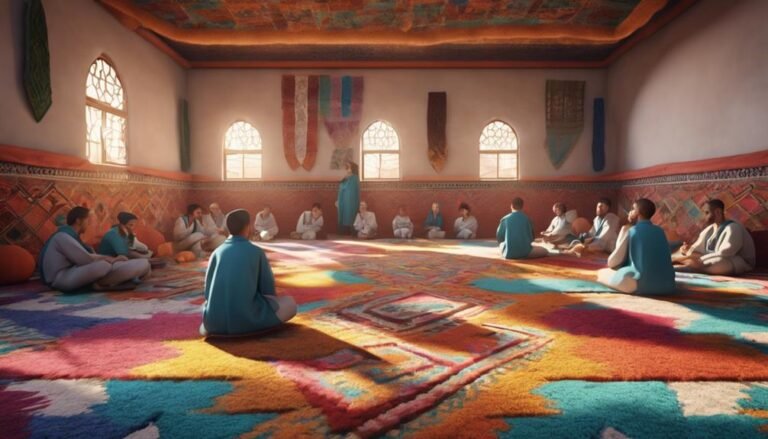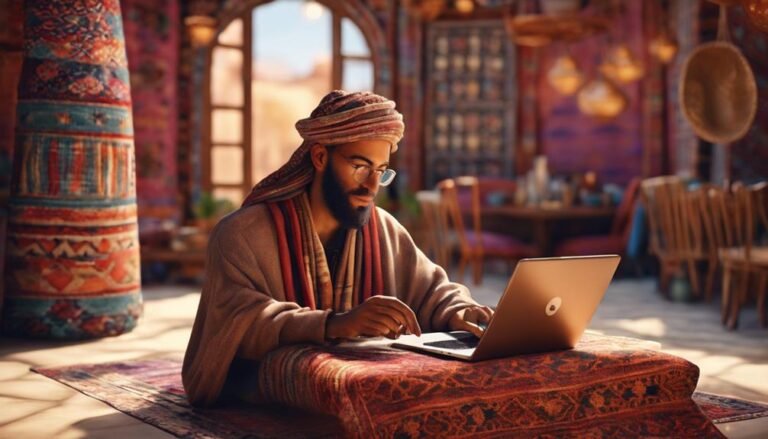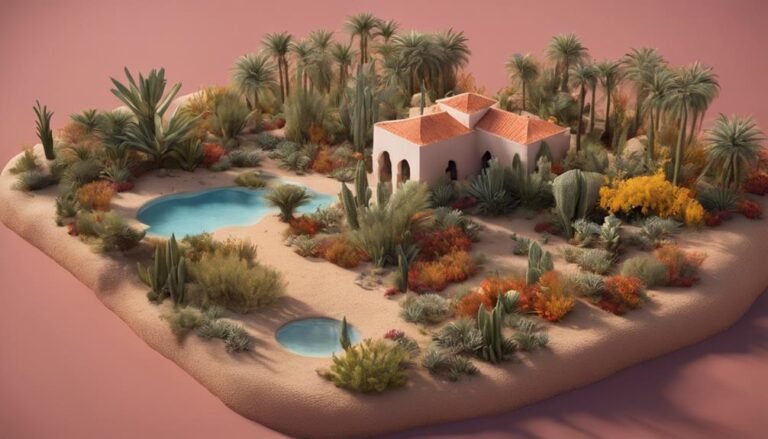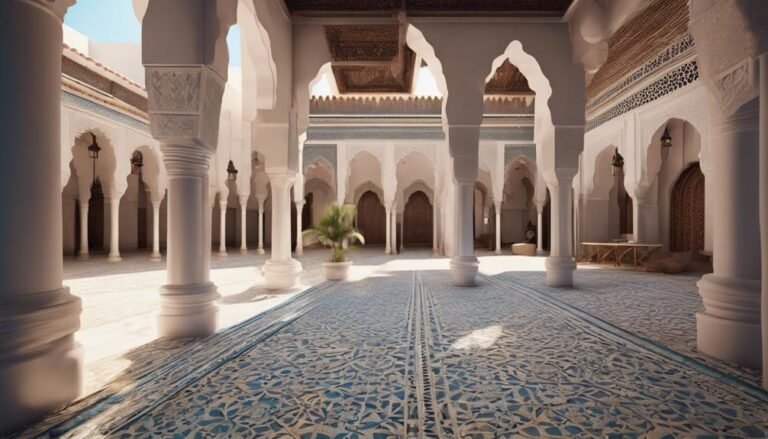Explore how tourism in Morocco weaves together economic prosperity, job opportunities, and vibrant cultural heritage. As you revel in the bustling markets and ancient cities, feel the impact of tourism boosting both the local economy and infrastructure development. Witness the preservation of centuries-old traditions, all while creating social connections and empowering small businesses. However, be mindful of environmental challenges and endeavor for sustainable practices to guarantee the longevity of this beautiful destination. In Morocco, tourism's effects reach far and wide, shaping communities and fostering a rich tapestry of experiences.
Key Takeaways
- Economic Boost: Tourism revenue significantly contributes to Morocco's GDP, boosting demand for goods and services.
- Job Creation: Tourism sector flourishes, creating employment opportunities and enhancing workforce development.
- Infrastructure Development: Significant strides in infrastructure, including road networks, airports, and terminals.
- Cultural Preservation: Initiatives in place to safeguard cultural heritage and landmarks.
- Social Change: Tourism shapes social fabric, fosters integration through cultural exchange, and promotes inclusivity.
Economic Boost
Tourism in Morocco has led to a significant economic boost, fueling growth in various sectors across the country. The increase in tourism revenue has had a profound economic impact, contributing substantially to the nation's GDP. The influx of tourists hasn't only created a demand for goods and services but has also spurred investment in infrastructure, hotels, and attractions, further stimulating economic development.
The economic impact of tourism is evident in the rise of small businesses catering to tourists, such as local shops selling traditional handicrafts and restaurants offering authentic Moroccan cuisine. These enterprises have flourished due to the steady stream of visitors, providing employment opportunities and boosting the overall economy.
Moreover, the revenue generated from tourism has been crucial in funding conservation efforts to preserve Morocco's natural and cultural heritage. This sustainable approach guarantees that future generations can continue to benefit from the economic advantages of a thriving tourism industry.
Job Creation
Job creation in Morocco's tourism sector has flourished due to the steady influx of visitors, providing numerous employment opportunities and contributing to the overall economic growth of the country. The expanding tourism industry has opened up various job opportunities for the local population, leading to enhanced workforce development. Many Moroccans have found improved employment prospects within hotels, restaurants, tour companies, and other related service sectors.
Moreover, the growth in tourism has prompted the need for skill training programs to meet the demands of the industry. As more visitors flock to Morocco, there's a higher demand for individuals skilled in hospitality, customer service, languages, and cultural knowledge. This has led to the establishment of training initiatives aimed at equipping locals with the necessary skills to excel in the tourism sector.
Infrastructure Development
As you explore the impact of tourism on Morocco, consider the significant strides made in infrastructure development.
The country has been actively expanding its road network to improve connectivity and accessibility for tourists.
Additionally, investments in airports and terminals have enhanced travel experiences, making Morocco a more attractive destination for visitors.
Road Network Expansion
How has the development of Morocco's road network impacted the country's tourism industry and overall economic growth?
The expansion of Morocco's road network has greatly alleviated traffic congestion in popular tourist areas, making travel more efficient and enjoyable for visitors. Improved road infrastructure hasn't only enhanced connectivity between major cities but has also opened up rural areas, providing better access to remote and culturally rich destinations.
This enhanced rural access has led to an increase in off-the-beaten-path tourism, benefiting local communities and promoting sustainable growth. The road network expansion has played a vital role in boosting Morocco's tourism sector and overall economic development by facilitating smoother transportation for both tourists and locals alike.
Airports and Terminals
Expanding and modernizing airports and terminals in Morocco has revolutionized the country's travel infrastructure, catering to the increasing demand of tourists and bolstering its position as a top destination in the region. The enhancement of airport facilities has greatly improved the passenger experience, offering modern amenities and efficient services.
This development has had a significant impact on tourism, as the increased terminal capacity allows for the handling of larger volumes of travelers, reducing congestion and wait times. The strategic upgrades in airports haven't only elevated the overall travel experience for visitors but have also facilitated smoother arrivals and departures, contributing to Morocco's appeal as a sought-after tourist hub in North Africa.
Cultural Preservation
Preserving Morocco's rich cultural heritage amidst the influx of tourism requires strategic planning and proactive measures. The country faces various preservation challenges as it aims to balance the benefits of tourism with the need to protect its heritage. With an increasing number of visitors exploring historical sites and participating in cultural activities, there's a growing concern about maintaining the authenticity and integrity of Morocco's traditions.
Heritage protection is a top priority for Moroccan authorities, who are implementing initiatives to safeguard key cultural landmarks and practices. Efforts include stringent regulations on development near sensitive areas, preservation projects to restore ancient sites, and educational campaigns to raise awareness about the importance of respecting local customs.
While tourism can contribute to the conservation of Morocco's cultural identity through funding and exposure, it also poses a risk of commodifying traditions for commercial gain. Balancing the economic benefits of tourism with the need for sustainable cultural preservation is essential to ensure that future generations can continue to experience the richness of Morocco's heritage.
Environmental Concerns
Amidst the flourishing tourism industry in Morocco, the environmental landscape faces critical challenges that demand immediate attention and sustainable solutions. Waste management is an urgent issue as the influx of tourists leads to a significant increase in litter and waste generation. The improper disposal of plastics and other non-biodegradable materials not only tarnishes the natural beauty of Morocco but also poses a serious threat to wildlife and marine ecosystems.
Conservation efforts play a vital role in mitigating the environmental impact of tourism. Initiatives aimed at preserving the diverse flora and fauna of Morocco, such as reforestation projects and protected area management, are essential for maintaining the ecological balance. Additionally, promoting responsible tourism practices, such as reducing plastic usage and supporting eco-friendly accommodations, can help minimize the negative effects on the environment.
To safeguard Morocco's natural heritage for future generations, it's essential to prioritize waste management strategies and enhance conservation efforts. By taking proactive measures to address these environmental concerns, Morocco can continue to thrive as a sustainable and eco-conscious tourist destination.
Income Inequality
When considering income inequality in Morocco due to tourism, it's important to understand how wealth distribution affects different societal groups. Economic disparity concerns arise as some regions benefit more than others, impacting the overall financial well-being of the country.
Unequal financial opportunities can lead to social tensions and hinder sustainable development in Morocco.
Wealth Distribution Effects
The impact of tourism on Morocco can be seen vividly through the lens of wealth distribution effects, especially when it comes to income inequality. As tourism grows, it brings both economic benefits and social implications. While the tourism sector generates wealth and creates employment opportunities, the distribution of these benefits isn't always paramount.
Income inequality can widen as tourism revenue often concentrates in specific regions or sectors, leaving others behind. This disparity can lead to social tensions and disparities in access to resources and opportunities. Efforts to address wealth distribution effects in Morocco's tourism industry are essential to make sure that the economic growth driven by tourism benefits a broader segment of the population, fostering a more inclusive and sustainable development path.
Economic Disparity Concerns
Significant concerns about economic disparity arise within Morocco due to income inequality exacerbated by the impact of tourism on the country. The influx of tourists has led to income disparities among different social groups, affecting the overall social fabric of Moroccan society. While some individuals benefit from the tourism industry by securing well-paying jobs or owning businesses catering to tourists, many locals, especially those in rural areas, face challenges such as limited job opportunities and low wages. This disparity not only widens the wealth gap but also contributes to social issues like unequal access to education and healthcare. Addressing income disparities is vital to ensure a more equitable distribution of wealth and opportunities for all Moroccans.
| Issues | Causes | Impacts |
|---|---|---|
| Limited job opportunities | Unequal distribution of tourism benefits | Widening wealth gap |
| Low wages | Lack of regulation in the tourism sector | Social inequality |
| Unequal access to resources | Dependence on seasonal tourism | Hindered social development |
Unequal Financial Opportunities
Amidst the bustling tourism industry in Morocco, disparities in financial opportunities persist, shaping the economic landscape for various social groups.
While tourism has brought economic benefits to Morocco, not all individuals have equally benefited from the industry's growth. The uneven distribution of wealth has led to income inequality, with some communities enjoying financial empowerment while others struggle to make ends meet.
Addressing these discrepancies is essential for sustainable development and poverty reduction initiatives in the country. By ensuring that the economic gains from tourism are more evenly distributed, Morocco can work towards creating a more inclusive society where all individuals have the opportunity to benefit from and contribute to the nation's economic prosperity.
Social Change
With each passing year, tourism in Morocco continues to shape and influence the social fabric of the country. The influx of tourists has brought about significant social change, fostering social integration and empowering local communities. Through cultural exchange, societal transformation is evident as traditional values intermingle with modern influences, creating a unique tapestry of diversity.
One of the key impacts of tourism on social change in Morocco is the promotion of social integration. As visitors from around the world immerse themselves in the local culture, bonds are formed, breaking down barriers and fostering a sense of unity among people of different backgrounds. This interaction not only enriches the experiences of tourists but also contributes to a more cohesive society within Morocco.
Furthermore, tourism plays a pivotal role in community empowerment by providing opportunities for locals to showcase their traditions, crafts, and ways of life. This empowerment not only preserves the rich cultural heritage of Morocco but also helps communities thrive economically and socially. Overall, the social changes brought about by tourism in Morocco are instrumental in creating a more interconnected and vibrant society.
Local Businesses
As you explore the impact of tourism on Morocco, you'll find that local businesses play a vital role in the country's economic landscape.
These businesses not only provide growth opportunities but also contribute to preserving the rich cultural heritage of Morocco.
From traditional crafts to authentic culinary experiences, local enterprises offer visitors a chance to engage with the heart and soul of the country.
Economic Growth Opportunities
Local businesses in Morocco are flourishing due to the influx of tourists seeking authentic cultural experiences. This trend has opened up sustainable growth opportunities and fostered economic diversification within local communities.
Community empowerment and rural development initiatives have gained momentum as tourism continues to boost the demand for traditional crafts, local cuisine, and unique accommodations. Small businesses, such as family-run guesthouses, artisan workshops, and neighborhood eateries, have thrived by catering to the preferences of travelers looking for genuine interactions and products.
The economic benefits generated by tourism have trickled down to support a variety of enterprises, enhancing the overall livelihoods of the local population. As Morocco embraces its role as a tourist destination, the landscape of its economy evolves, offering new prospects for growth and prosperity.
Cultural Preservation Efforts
Amidst the bustling streets of Morocco, businesses dedicated to preserving local culture are weaving a tapestry of tradition and innovation. These enterprises play an essential role in heritage conservation and community engagement, ensuring that Morocco's rich history remains vibrant and accessible to locals and tourists alike.
Here are three ways these businesses are making a difference:
- Hosting workshops and demonstrations to educate visitors on traditional crafts and practices.
- Collaborating with local artisans to create authentic, handmade products that showcase Morocco's artistic heritage.
- Organizing cultural events and festivals that celebrate the diverse traditions and customs of the region, fostering a sense of pride and belonging within the community.
Overcrowding Issues
Visitors flock to Morocco's popular attractions, causing significant overcrowding issues in key tourist destinations. The environmental impact of this overcrowding is evident, with increased waste generation, strain on natural resources, and damage to delicate ecosystems. Sustainability measures are essential to mitigate these effects and preserve Morocco's beauty for future generations.
The bustling streets of Marrakech, with its vibrant markets and historic sites, often become overwhelmed with tourists, leading to congestion and a decline in air quality. The UNESCO World Heritage site of Chefchaouen, known for its blue-painted buildings, faces challenges as the narrow alleyways become packed with visitors, impacting the town's charm and local residents' way of life.
Overcrowding not only affects the environment but also diminishes the quality of experience for travelers seeking an authentic Moroccan adventure. To address these issues, implementing visitor limits, promoting off-peak travel, and supporting community-based tourism initiatives are vital steps towards ensuring a more sustainable and enjoyable travel experience in Morocco.
Sustainable Tourism Efforts
As Morocco grapples with the challenges of overcrowding in its tourist hotspots, initiatives promoting sustainable tourism practices have emerged as a beacon of hope for preserving the country's natural and cultural treasures. Through community engagement and environmental sustainability efforts, Morocco is working towards guaranteeing that its tourism industry develops responsibly for future generations.
- Community Engagement: Local communities are being actively involved in decision-making processes regarding tourism development. This guarantees that their voices are heard, and their cultural heritage is respected, leading to a more authentic and mutually beneficial experience for both locals and tourists.
- Environmental Sustainability: Initiatives focusing on reducing plastic waste, promoting renewable energy sources, and protecting fragile ecosystems are gaining traction. By implementing eco-friendly practices, Morocco aims to minimize its environmental footprint and safeguard its breathtaking landscapes for years to come.
- Cultural Preservation: Efforts to preserve traditional crafts, languages, and customs are being supported. By showcasing and celebrating Morocco's rich cultural diversity, tourists are encouraged to engage with the country's heritage in a respectful and meaningful way.
Conclusion
As you step back and admire the vibrant tapestry of Morocco's tourism impact, you can see it's like a colorful mosaic that brings prosperity and opportunities while preserving its rich heritage.
Like a delicate dance between tradition and modernity, the country's sustainable efforts are key to maintaining its charm without compromising its natural beauty.
So next time you visit Morocco, remember to tread lightly and appreciate the delicate balance that keeps this magical destination thriving.

The Editorial Team is a passionate group of Morocco enthusiasts dedicated to sharing the beauty, culture, and wonders of this captivating country. With diverse backgrounds and a deep love for travel, we strive to bring you engaging and informative content that inspires your Moroccan adventures. From uncovering hidden gems and sharing local insights to exploring mouthwatering cuisine and showcasing the vibrant lifestyle, our team is committed to providing you with valuable resources and exciting stories that enhance your exploration of Morocco. Join us on this journey as we celebrate the rich heritage and unforgettable experiences that make Morocco truly special.

